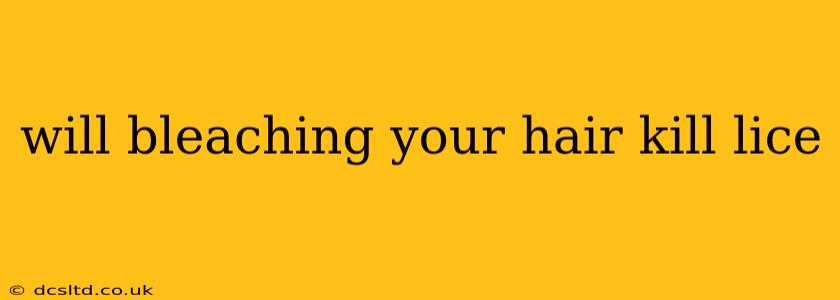Will Bleaching Your Hair Kill Lice? The Truth About Hair Bleaching and Lice Treatment
The question of whether bleaching your hair kills lice is a common one, fueled by the harsh chemicals involved in the process. While bleach is a powerful disinfectant, the answer isn't a simple yes or no. Let's explore the complexities of this question and delve into safer, more effective lice treatment methods.
Does Bleach Kill Lice Directly?
While bleach is a powerful oxidizing agent capable of killing many microorganisms, its effectiveness against lice is not guaranteed and highly discouraged. The lice are protected by their exoskeleton, and it's difficult to ensure sufficient contact with the bleach to kill all the lice and their eggs (nits). Improper application can lead to severe scalp burns and hair damage, making it a dangerous and ultimately ineffective approach.
What are the Risks of Using Bleach on Hair to Treat Lice?
The risks associated with using bleach to treat head lice significantly outweigh any potential benefits. These include:
- Severe Chemical Burns: Bleach is a caustic substance and can cause severe burns to your scalp, leading to pain, blistering, and scarring.
- Hair Damage: The harsh chemicals in bleach can severely damage your hair, leading to breakage, dryness, and even permanent hair loss.
- Allergic Reactions: Some individuals may have allergic reactions to bleach, ranging from mild skin irritation to severe allergic responses.
- Ineffectiveness: Even if you manage to avoid the aforementioned risks, there's no guarantee that the bleach will effectively eliminate all lice and nits. Many will likely survive.
What are the Effective Ways to Treat Head Lice?
Instead of resorting to dangerous and ineffective home remedies like bleach, consider these proven and safe methods for treating head lice:
- Over-the-Counter Medications: Pharmacies offer various over-the-counter (OTC) lice treatments containing permethrin or pyrethrin. Always follow the instructions carefully. Multiple applications may be necessary.
- Prescription Medications: If OTC treatments are ineffective, your doctor may prescribe stronger medications.
- Manual Removal: This involves meticulously combing through the hair with a fine-toothed comb (a nit comb) to remove lice and nits. This is often a time-consuming but effective process, especially when used in conjunction with other treatments.
- Professional Lice Removal Services: Many companies offer professional lice removal services. They have specialized tools and expertise to effectively eliminate lice and nits.
How to Prevent Head Lice?
Preventing head lice is crucial. Here are some preventive measures:
- Regular Hair Checks: Regularly check your hair and your children's hair for lice.
- Avoid Head-to-Head Contact: Discourage children from sharing hats, scarves, combs, and brushes.
- Washing Bedding and Clothing: Wash all bedding and clothing in hot water after a lice infestation.
Is there a natural way to get rid of lice?
While some natural remedies are touted as effective lice treatments, scientific evidence supporting their efficacy is limited. It's best to rely on proven methods rather than potentially ineffective and time-consuming home remedies. Always consult a healthcare professional or pharmacist for advice on safe and effective lice treatment options.
In conclusion, while the idea of using bleach to kill lice might seem appealing due to its disinfectant properties, the risks significantly outweigh the benefits. The potential for severe scalp damage and the lack of guaranteed effectiveness make it a highly inadvisable approach. Focus on safe and effective treatments and preventive measures to deal with lice infestations.
